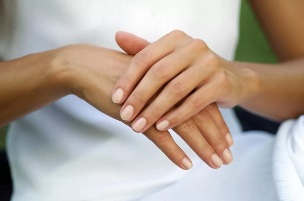
Psoriasis is a fairly common dermatological condition characterized by a scaly and intense itching of the damaged skin. There are many types of these diseases. The most common types of psoriasis should be looked at in detail and these lesions can also be seen in the photo.
Cause of the disease
The disease is usually chronic. It grows for the following reasons:
- Weakens the immune system. Abnormal immune processes lead to thickening of the skin, so that the chronic form of the disease gradually begins to develop.
- Genetic disposition. The chance of skin damage is quite high if at least one of the parents has psoriasis.
- Neurological disorders and emotional upheaval. This is one of the most serious factors in the development of this skin disease.
- Hormonal imbalances. Pathological changes in the endocrine system motivate the onset of the first signs of psoriasis.
- Disrupts metabolism in the body. This is due to a lack of vitamins and other nutrients.
- Presence of parasitic diseases. Toxic substances that helminths poison the human body can damage the skin.
Modern medicine has yet to find the exact cause of this pathology.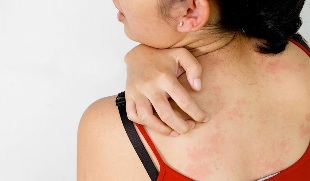 Usually, experts find an association between immune system disorders and psoriasis flare-ups.
Usually, experts find an association between immune system disorders and psoriasis flare-ups.
Symptoms of the disease
As mentioned, there are many types of these dermatological diseases. Depending on this, the patient may have different symptoms. The most common forms of psoriasis and their signs should be examined in more detail.
Purulent Psoriasis
Represents the appearance of white scaly patches. Affected skin becomes inflamed and changes color. Such plaques increase in size, flaking off over time. The psoriasis on the hands may not be scaly, especially on the folds. In these locations, the skin becomes red, itchy, and painful. Psoriasis in the groin develops the same way. Generalized psoriasis can affect most areas of the skin.
Psoriasis tears
This form of the disease gets its name due to the volcanic, convex eruption of the water droplet. They are purple in color. Droplet-shaped tumors usually spread on the back, abdomen and affect most parts of the body. They cause intense itching, especially during exacerbations.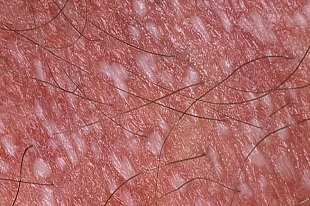 Usually, this form of the disease developed as a result of infectious diseases in the past.
Usually, this form of the disease developed as a result of infectious diseases in the past.
Purulent psoriasis: photo
This type of psoriasis is the appearance of small sprouting nodules filled with transparent liquid. The skin around these small bumps becomes inflamed and becomes bright red. It can come off quickly, causing pain. Often this form of the disease manifests itself on nail plaques. Can see what a purulent psoriasis looks like in the photo.
Psoriasis arthritis
It develops gradually, the first stage of this disease can pass without any symptoms. Damage to the joint and muscle tissue. As the patient develops, the patient begins to experience discomfort in the affected joint area, stiffness in movement, especially after waking up. The skin in the affected area becomes inflamed and red. The joints of the upper and lower extremities are often affected by psoriatic arthritis.
Palmar-plantar Psoriasis
This is a fairly common disease. It is characterized by lesions in the palms of the hands and soles of the feet. In these places, dense nests appear with clear edges. Persistent dry and flaky skin can lead to cracks. In such situations, extreme caution is required as possible wound infections. 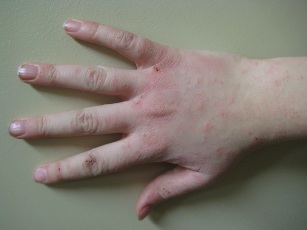 The skin in the affected area becomes hard and rough.
The skin in the affected area becomes hard and rough.
Early psoriasis: Photo
How did the development of this pathology begin? This disease in the early stages may have no symptoms. Small, pale pink patches appear often. The skin surface on them remains smooth and shiny. After a few days, the plaques become covered with small, itchy scales in the affected areas beginning to become uncomfortable. These scales easily move out of the plaque, and under the skin appears inflamed. This process is called dot psoriasis.
Psoriasis in children
This disease can even occur in babies. It is always accompanied by a painful sensation in the affected areas, followed by intense itchiness. The forming plaques often crack, mild bleeding begins to occur. This process is called capillary psoriasis. The danger of this form is that the wounds that have already formed in the child can become infected.
Psoriasis on the head: photo
It is not uncommon to see a scalp damaged by this disease. With such an advanced form of damage, hair falls out and stops growing. Localized drives can be observed in such places on top:
- psoriasis behind the ears;
- in the occipital region and on the forehead;
- psoriasis on the neck;
- on the scalp.
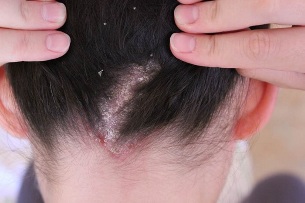
The first condition is usually accompanied by the following symptoms:
- mild scabs accompanied by itching and irritation;
- inflammation in the affected area;
- scratching painful spots leads to damage;
- skin gradually becomes coarser and thicker;
- dandruff on the scalp;
- skin is very susceptible to serious injuries;
- itching increases with each day.
Advanced Psoriasis - photo
A progressive disease that can lead to dangerous consequences. In addition to psoriatic arthritis, a person can develop the following pathologies:
- disturbs the function of the heart and blood vessels;
- ischemic disease;
- stroke;
- arrhythmia.
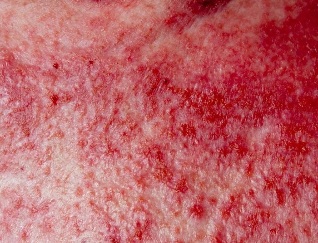
Patient begins to feel such diseases:
- Inflammatory skin
- is purple in color;
- general weakness of the body;
- increases in body temperature;
- tachycardia;
- is too poor to eat;
- muscle and joint weakness.
With the progressive form of the disease, a significant area of skin is affected. The patient feels weak and constantly tired. Therefore, it is very important to start treatment early.
Consequences of the disease
It's no secret that psoriasis eruptions dramatically decrease quality of everyday life. Affected people may have the following psychological and physical problems:
- is afraid of playing sports;
- needs to regularly conceal your illness;
- confidence slowly fades away;
- develops a state of chronic depression;
- has a problem with the opposite sex, one begins to avoid being intimate with loved ones.
Also, in some cases, this pathology negatively affects a person's choice of a professional activity.
Therefore, the disease has a negative impact on not only physical health but also psychological - emotional state. At the first signs of psoriasis, you need to contact a specialist for help. Your doctor will prescribe the most effective treatment for getting rid of genital warts as soon as possible.























